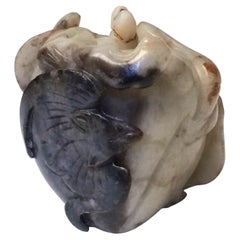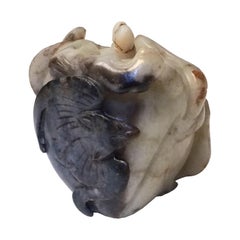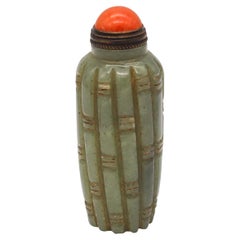Nephrite Snuff Bottle
Antique 19th Century Chinese Qing Tobacco Accessories
Jade
Recent Sales
Antique 1840s Chinese Qing Sculptures and Carvings
Jade
Antique 1880s Chinese Qing Sculptures and Carvings
Coral, Jade, Bronze
Antique 19th Century Chinese Qing Ceramics
Stone
A Close Look at Qing Furniture
The last imperial dynasty from 1644 to 1912 was a time of change in China, beginning with the invasion by Manchurian forces that ended the Ming dynasty and established the Shunzhi Emperor. The expansion of exportation and trade that had bolstered the arts during the Ming era continued, as Qing dynasty furniture involved the same attention to craftsmanship with expert construction techniques in hardwood pieces that were assembled with mortise and tenon joints rather than nails or glue. Together, these eras comprise a golden age of Chinese furniture design.
Ming-style furniture is simple and elegant with clean lines. Chairs of the period and other Ming furniture made an impression on Scandinavian modernist Hans Wegner and his streamlined seating, for example. Whereas Qing-style furniture is elaborate, with an increasing influence from the West leading to lavish carving inspired by the European Baroque and Rococo styles. And while many of the forms that define examples of the latter are common within classical Chinese furniture, such as curving and folding chairs as well as large screens, Qing designs are laden with ornamentation. Frequently, the carved motifs and inlaid designs in mother-of-pearl were auspicious, such as peonies for wealth or dragons for luck. Bats were symbols of happiness in the design of Qing furniture, with one of the characters in the word for bat, bianfu, being a homophone for fu, or “fortune.”
While several types of wood were used in the construction of Qing beds, tables, storage pieces and seating, today’s collectors know that the most prized were the rare rosewoods zitan and huanghuali. They were both sourced from Hainan, China’s largest island, and are marked by a rich luster that occurs naturally, without the application of lacquer or other decorative materials. Many of the most popular woods were imported from southeast Asia, adding to their value. Red sandalwood was also sought after for its durability and connection with Chinese medicine, with some chairs being made for health benefits.
Find a collection of antique Qing tea tables, stools, benches, decorative objects and more furniture on 1stDibs.
- What are Chinese snuff bottles?1 Answer1stDibs ExpertApril 5, 2022Chinese snuff bottles are decorative containers originally produced during the Qing Dynasty. Their original purpose was to hold powdered tobacco. However, most people use snuff bottles as decorative objects today. You can find a range of Chinese snuff bottles on 1stDibs.
- What is an antique snuff bottle?1 Answer1stDibs ExpertApril 5, 2022Snuff bottles were used in China in the early 18th century. The bottle contained powdered tobacco, which was illegal to smoke, but was considered a remedy for colds and headaches and was therefore allowed in bottles in powdered form. On 1stDibs, find a collection of authentic snuff bottles from some of the world’s top sellers.
- What is a snuff bottle used for?1 Answer1stDibs ExpertOctober 12, 2021Snuff bottles are containers designed to hold small amounts of snuff, which is a type of powdered tobacco popularized in China during the Qing Dynasty for its medicinal advantages. Find a variety of antique and modern snuff bottles to shop on 1stDibs.


